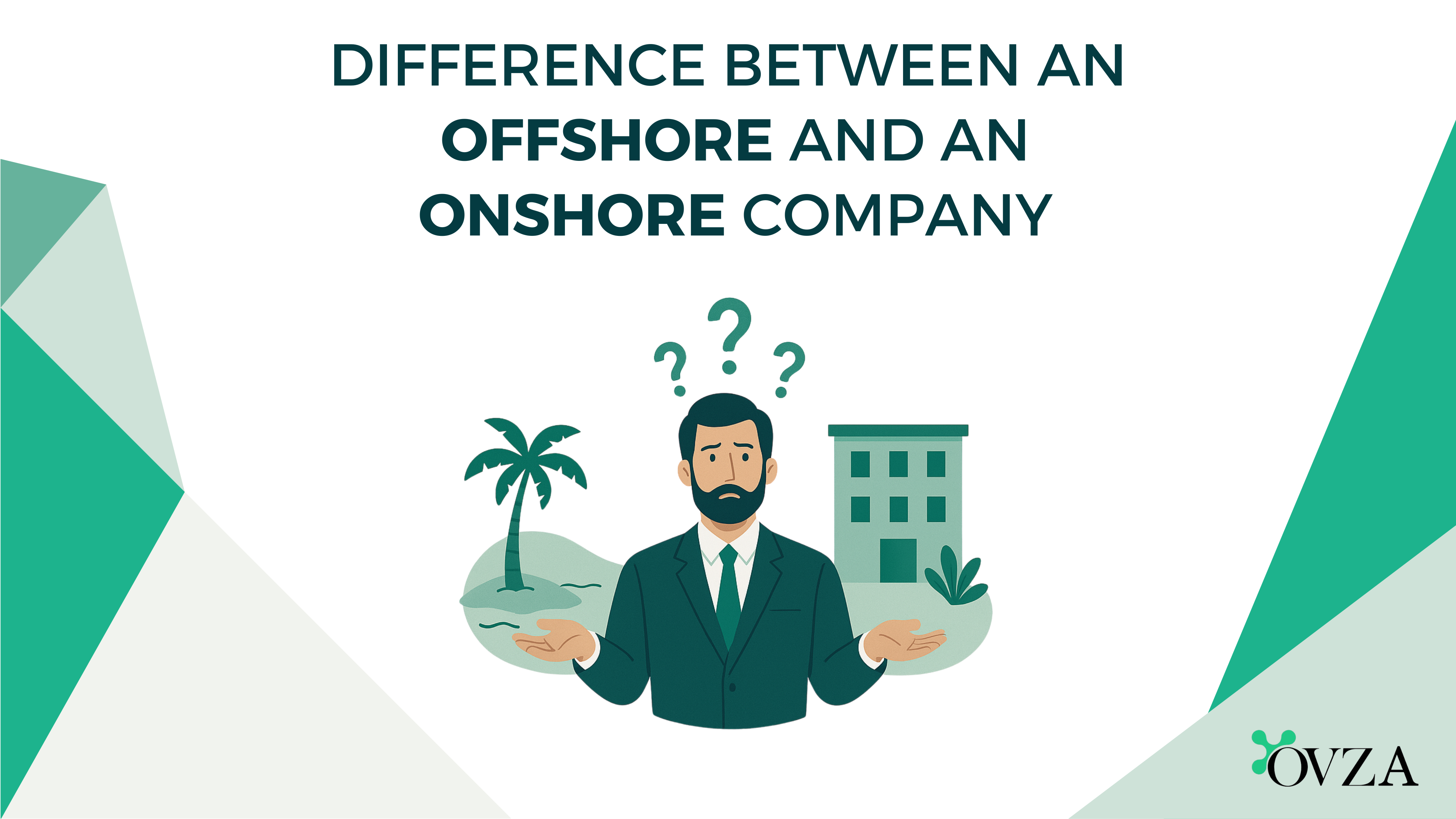The difference between an offshore and an onshore company is a foundational concept in international business law and corporate structuring.
While both are legally recognized entities, their regulatory obligations, tax exposure, and strategic purposes vary significantly. Understanding the legal distinction between the two is essential for entrepreneurs, investors, and corporations engaging in cross-border activity or evaluating business formation options.
This article outlines the legal and functional differences between offshore and onshore companies, covering jurisdiction, tax treatment, compliance requirements, and their respective use cases under modern international law.
Legal Definitions
To understand the difference between an offshore and an onshore company, it is necessary to begin with jurisdiction.
An onshore company is incorporated and operates primarily within its jurisdiction of formation. It is subject to full domestic corporate, tax, and regulatory frameworks. A U.S. LLC operating in Florida or a German GmbH based in Berlin are both examples of onshore entities.
An offshore company, on the other hand, is formed in a foreign jurisdiction but conducts little or no business in that jurisdiction itself. It is generally used to manage international operations, hold assets, or facilitate cross-border transactions. Jurisdictions like the British Virgin Islands, Seychelles, Belize, and the Cayman Islands are commonly used for offshore incorporation.
The difference between an offshore and an onshore company lies not only in location but in the legal relationship the entity maintains with its home and host jurisdictions.
Here’s a side-by-side comparison:
| Criteria | Onshore Company | Offshore Company |
|---|---|---|
| Jurisdiction | Incorporated and operating in the same country | Incorporated in a foreign jurisdiction, operating elsewhere |
| Primary Business Activity | Domestic market, local operations | Cross-border activity, international transactions |
| Regulatory Oversight | Full compliance with domestic laws, tax, and labor regulations | Subject to local offshore rules; lighter domestic regulatory obligations |
| Examples | LLC in the U.S., Ltd in the UK, GmbH in Germany | IBC in BVI, LLC in Nevis, Company in Seychelles |
| Legal Purpose | Domestic commercial activity | Asset protection, tax efficiency, international holding, licensing, etc. |
Tax Treatment
Another critical difference between an offshore and an onshore company involves taxation. Onshore companies are taxed under the full regime of their home country. They must file corporate income tax returns, pay local taxes on profits, and often comply with VAT, employment taxes, and other statutory obligations.
Offshore companies, by contrast, are often exempt from local corporate taxes in their jurisdiction of incorporation, provided their income is derived from outside that jurisdiction. However, this does not exempt the owners of offshore companies from global tax responsibilities. Most countries apply Controlled Foreign Corporation (CFC) rules or global reporting standards, such as the OECD Common Reporting Standard (CRS), to ensure offshore entities are not used for tax evasion.
Thus, a key difference between an offshore and an onshore company is how income is taxed and reported. Offshore companies may be tax neutral in their place of formation, but they are increasingly subject to transparency and reporting obligations in the owner’s home country.
Compliance
The difference between an offshore and an onshore company also extends to regulatory compliance. Onshore companies typically operate in a tightly regulated environment, requiring audited financial statements, public registries of directors and shareholders, and adherence to national labor and licensing laws.
Offshore companies historically operated with greater privacy and fewer compliance requirements. However, with the implementation of economic substance laws and beneficial ownership disclosure regimes, the regulatory gap has narrowed. Offshore jurisdictions now routinely require companies to disclose their true owners to local regulators and demonstrate legitimate business activity if they engage in certain sectors.
In effect, the difference between an offshore and an onshore company is no longer defined by secrecy versus transparency — but by how each structure aligns with the global movement toward lawful cross-border reporting and regulatory cooperation.
Use Cases
The difference between an offshore and an onshore company also reflects the strategic purpose behind their formation. Onshore companies are ideal for domestic operations, including retail, manufacturing, and services delivered within the local economy. They are used when the business has a physical presence and engages directly with the local regulatory environment.
Offshore companies, in contrast, are often formed to facilitate international business. This includes holding intellectual property, managing global investments, or licensing software and content across jurisdictions. Offshore entities are also used for estate planning, asset protection, and forming joint ventures across borders.
For many global entrepreneurs, the difference between an offshore and an onshore company can determine the flexibility and efficiency of their operations.
Regulatory Developments and Convergence
Over the last decade, global regulation has reshaped the difference between an offshore and an onshore company. Increasingly, offshore jurisdictions are adopting onshore-style rules to remain in good standing with international standards. Beneficial ownership registers, automatic information exchange, and economic substance tests have reduced the regulatory gap between the two.
At the same time, some onshore jurisdictions — such as Delaware, Wyoming, and the UK — have introduced simplified company structures that provide similar efficiencies to traditional offshore entities. This regulatory convergence means that the difference between an offshore and an onshore company is now more about purpose, compliance strategy, and risk profile than outdated notions of secrecy or avoidance.
Conclusion
The difference between an offshore and an onshore company is grounded in legal status, jurisdictional reach, tax obligations, and compliance expectations. While both serve legitimate roles in the global economy, they are designed for different operational contexts.
An onshore company operates within and is regulated by its domestic legal system. It is the default option for businesses with a local footprint. An offshore company, when lawfully structured, offers international reach, tax efficiency, and strategic flexibility, but must be managed with full awareness of cross-border legal obligations.
In today’s regulatory environment, the decision to go offshore must be informed, transparent, and aligned with global standards. The difference between an offshore and an onshore company remains relevant — but only when understood within the broader context of lawful international business structuring.
Disclaimer: The information provided on this website is intended for general reference and educational purposes only. While OVZA makes every effort to ensure accuracy and timeliness, the content should not be considered legal, financial, or tax advice.













